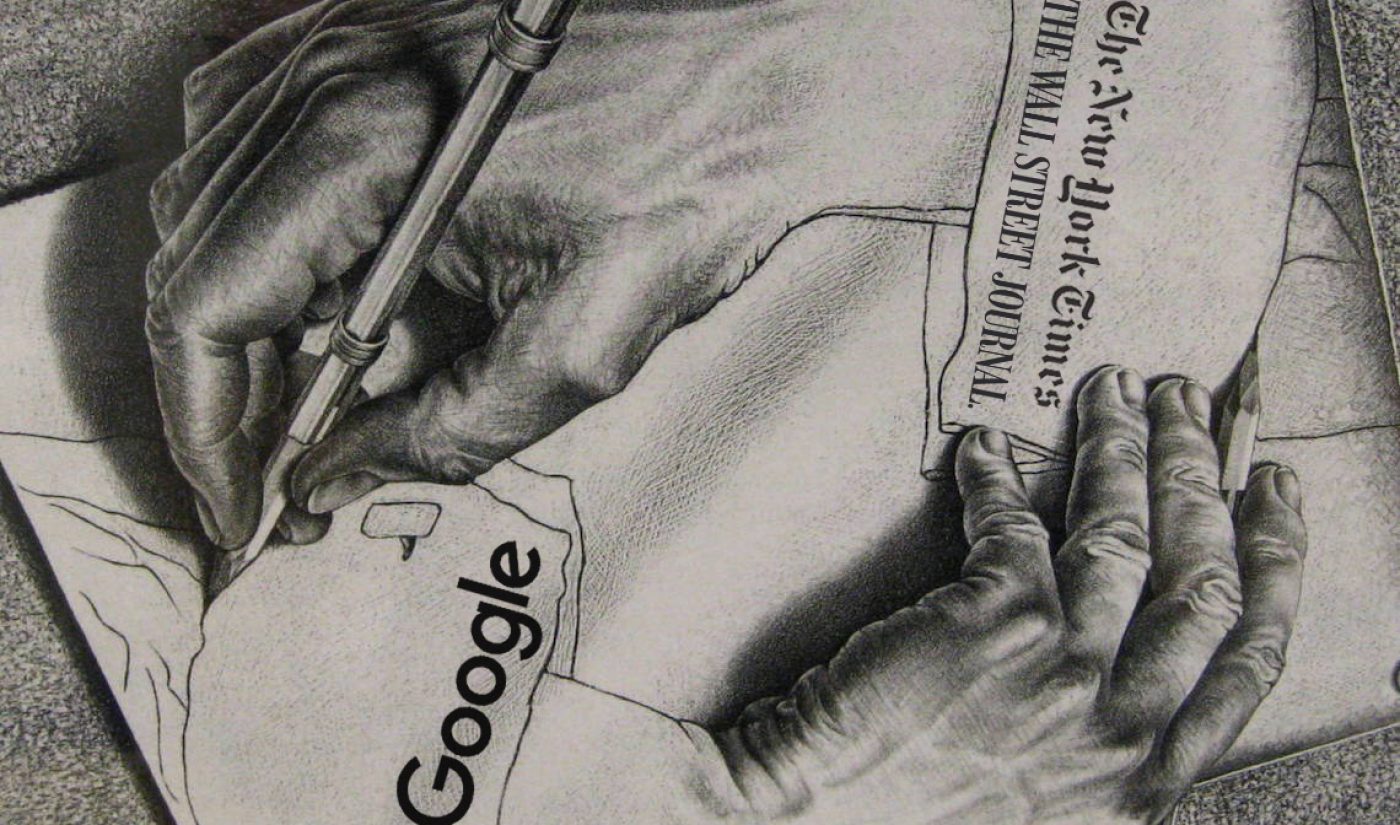Insights is a weekly series featuring entertainment industry veteran David Bloom. It represents an experiment of sorts in digital-age journalism and audience engagement with a focus on the intersection of entertainment and technology, an area that David has written about and thought about and been part of in various career incarnations for much of the past 25 years. David welcomes your thoughts, perspectives, calumnies, and kudos at david@tubefilter.com, or on Twitter @DavidBloom.
The late M.C. Escher, the Dutch artist whose recursive graphics continue to trip out fans, never got to diagram the dysfunctional relationship between online publishers and Google. But my, what fun he would have had drawing the latest turn of events here. Irony has piled on irony in a circle of confusion only an Escher could hope to portray.
To begin with, the battered publishing industry is asking for an antitrust exemption so it can band together to better negotiate with Google. Publishers say they need the exemption because Google has built a near-impregnable position astride the lucrative business of search-based advertising. That position exists because there are gaping holes in the very same, wildly outdated antitrust laws from which the publishers are seeking an exemption.

Subscribe for daily Tubefilter Top Stories
On top of that, the news organizations seek an exemption from a Congress and, especially, an administration that have been notably hostile to the media’s mere existence.
And in yet another Escher-esque irony, the early days of the Trump Administration – in all its leak-ridden, back-stabbing, self-contradicting dysfunction – actually have been great for real journalism.
The New York Times and Washington Post both saw subscriptions rise dramatically after Trump won, even as Our Only President repeatedly referred to the two giants of American journalism as “failing” and “fake news” in his frequent early-morning Twitter rants. The Times alone added 276,000 subscribers in 2016’s Q4. This year’s first quarter saw it add 308,000 more, boosting circulation revenue 11% and digital ad revenue 19%. The company now boasts more than 2.2 million digital-only subscribers.
Both publications (along with many other Mainstream Media outlets) have doubled down on marketing and investment in new reporters and areas of reporting (the Post’s assignment of Pulitzer winner David Farenthold to a newly created “Emoluments” beat, for example).
So, things are looking up a bit for at least some serious news outlets. And negotiating en masse could be a productive response to Google’s overwhelming market power. The company generated more than $35 billion last year from online advertising, up 20% from 2015. Its share of the business roughly equals that of everyone else online combined. It’s possible that a publishers association of thousands of major outlets, operating in (legal) concert, could extract a more balanced sharing of the rents exacted by Google for pointing visitors to their sites and stories.
But don’t expect Google to go quietly. As the Wall Street Journal detailed this week, the company has paid academics as much as $400,000 each to write dozens of papers that happen to bolster its positions on issues such as….antitrust law and monopolies. Often, those payments were not disclosed when Google presented the papers in regulatory proceedings. Yes, paying off researchers for sympathetic position papers is a time-honored approach used by industries such as tobacco, sugar, automobiles, and pharma. But those papers have also helped Google win previous antitrust cases in the United States (if not in the European Union, which has successfully sued it repeatedly over antitrust, privacy, and other issues).
Even in the face of such efforts, however, you could imagine a publishers association working out deals for a more equitable approach, maybe something like the carriage fees that cable and satellite companies pay networks.
That business model has its own problems in an era of Cord Cutters and Cord Nevers. But the precedent of an intermediary paying for the privilege of making (a lot of) money by connecting consumers to copyrighted material is well established. A deal might be based on a revenue share tied to traffic click-throughs or some other metric. Google (and other search engines) would still reap billions, but it might rebalance an arrangement that’s badly out of whack, and left too many publishers struggling to exist.
And of course, publishers need to keep innovating throughout the rest of their businesses. Some actually are.
The New York Times, for instance, has created a range of subscription content far beyond just its main news feed. Its latest initiative: converting its popular Cooking site to a subscription-only offering. The service offers millions of recipes, guides (“How to Cook Potatoes,” for instance), advice on techniques and tools, features on prominent chefs and more. If you see a recipe you like, a single click stores it in your personalized “Recipe Box” for future reference. Engagement has been driven by brightly written email newsletters a couple of times a week that spotlight recipes, other must-read Times stories, as well as other tidbits of cultural conversation and commentary.

I’ve enjoyed the free service, occasional fuel for my many culinary creative impulses. That said, I don’t know that I’ll pay $1.25 a week for continued access after a 28-day free trial expires in a couple of weeks. In part that’s because I already bought the Times’ own great mobile app How to Cook Everything by its food writer Mark Bittman.
But the Times Cooking site also brings with it a community of other amateur foodie enthusiasts, with their many recipe tweaks and ideas, as well as lots of useful resources. Certainly, the company can expect a significant portion of the service’s many readers to tag along when it goes full subscription. I eventually may be one of them.
In the meantime, I’ll be employing my inner Escher to track the recursions of irony and complication to come in the continuing battle over monopoly power in the era of the network effect. Who needs mood-altering substances? This is all one big trip.








